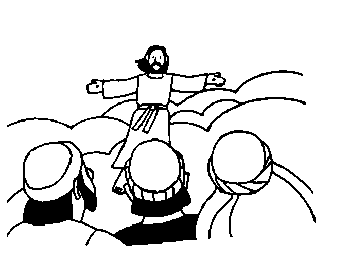
The Ascension of Our Lord
The Disciples Look Up into Heaven

Acts 1: 1 - 11
Luke 24: 44 - 53
The book of Acts was written
by Luke, whom we know best from the Gospel of Luke,
his story of Jesus' life and ministry. Theophilus
is a Greek name which means someone who loves God
or is beloved by God. It may be the name of a real person, or it may be
Luke's name for a student or disciple who loved
God.
Jesus told the disciples to wait in Jerusalem
until the Holy Spirit would come to baptize them. The Holy Spirit appeared to the disciples
eight days later when the disciples gathered together to celebrate the Feast of the Pentecost.
Apostles are followers of Jesus who may or may not have known him personally.
All the disciples were apostles, but all the apostles were not disciples,
Jesus' followers from the early days of his ministry. Disciple
means student, while apostle means someone who is sent out
to do a task. After the Ascension, Luke always refers to all the disciples
as apostles.
Jesus told his followers that they would be his witnesses in Jerusalem,
Judea and Samaria, and to the ends of the earth. He gave them an extraordinary
commission: not only were his apostles to tell their stories about Jesus
in Jerusalem, in the Temple where he taught
and where they met to talk about him, but they were also to share the good
news in Judea and Samaria, as though they were
all the same place.
"The ends of the earth" meant Rome, the seat of the government
that occupied Judea and Samaria. The Romans led personal lives that were
thoroughly repugnant to both the Judeans and the Samaritans, and both the
Judeans and the Samaritans were tired of being ruled by hard-hearted foreigners.
Judea and Samaria were separate regions
or provinces of the Roman government in Palestine
which were located right next to each other. Judea was the home of the observant
Jews who worshiped in the Temple in Jerusalem.
Samaria was the home of the Samaritans, who followed only the first five
books of the Bible (Genesis, Exodus, Leviticus, Numbers, and Deuteronomy)
and who worshiped God in the high places in Samaria, instead of in the Temple
in Jerusalem.
Although both the Jews and the Samaritans were descended from Abraham,
Isaac, and Jacob, the Jews of Judea were so certain
that the Samaritans were unclean in the eyes of God that they would not
eat with them - or even draw water from the same wells
- and the Jews and Samaritans disliked each other intensely.
The Samaritans thought the Judeans had been corrupted by their captivity in Babylon, incorporating Babylonian ideas into the Hebrew practice the Samaritans had followed since the time of Joshua.
The only two groups of people in the
whole world who worshiped the One God had become strangers, and then enemies.
But Jesus told his followers to witness to both the people of Judea, who
followed every law carefully, and to the people of Samaria, whom the Judeans
hated bitterly, at the same time!
He gave clear instructions to witness to the know-it-alls, the self-righteous, the strangers, the enemies, the tyrants, and the oppressors - all at once. Can we find ourselves in this list?
1. Even after Jesus' death, the disciples were still expecting him
to overthrow the Roman government and to establish a Jewish government instead.
What did they ask him?
[The disciples asked, "Lord, is
this the time you will restore the kingdom to Israel?"]
2. What did Jesus promise to the disciples instead?
[Jesus promised that the Holy Spirit
would come upon them.]
3. What did the disciples do while Jesus was lifted up in a cloud
into heaven?
[The disciples watched him rise up in
the cloud.]
4. Who suddenly appeared to the disciples?
[Two men in white robes suddenly stood
by the disciples.]
5. What did the men say to the disciples?
[The men said, "Men of Galilee, why do you stand looking up toward heaven?]
Calendar | HomePage | References and Resources | Ascension Art | Pentecost 1 Lesson